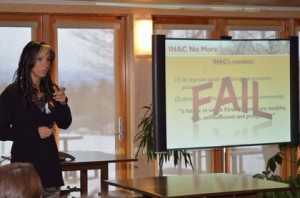‘Genocide, genocide, genocide’

By Marci Becking
Dr. Pam Palmater is frequently asked by Canadians “Why don’t First Nations people just get over it”.
“The second they can tell me what the ‘it’ is that we’re supposed to get over, then we can have a conversation,” says Palmater who spoke to Union of Ontario Indians staff on March 22.
The chair of Indigenous Governance at Ryserson University says she has yet to meet a Canadian who knows what the “it” is. And no Canadian has taken her up on her offer to switch places if they can.
The Mi’Kmaq lawyer says she is most closely monitored by government agencies when she speaks of two topics: sovereignty and genocide. So she talks about it more often – especially during a presentation where a phone line is open.
“We’ve never given up our sovereignty,” says Palmater who goes on to refer to the sterilization of First Nations women by the Canadian government was an act of genocide. “Genocide, genocide, genocide.”
Palmater, who has been at many speaking engagements since the Idle No More movement exploded onto the Canadian political scene in December, says that there is no one leader for the movement and that everyone who participates is a leader.
“There is no dividing line between who is Idle No More and who isn’t,” says Palmater. “Political, non-political, on-reserve, off-reserve, Status, non-status. Idle No More is all-inclusive.”
Palmater encourages everyone to educate themselves, stay informed and educate others.
“Send letters to MPs, Senators and the Prime Minister. Send in official positions on legislation to Parliament; there needs to be political pressure and advocacy, First Nations need to implement and enforce their own laws. And action on the ground to assert and defend our rights.”
“All we want is what other people get in the other provinces; we’re entitled to a lot more. But if we only got what other people are getting in the provinces, we’d be bringing in $179 billion in gross domestic product. That’s if we only equalized education. What if we equalized health, housing and water? The decisions that are being made in this country cost Canadians money.
She says that Canada could be saving billions of dollars and making billions of dollars.
“$100,000 to put one aboriginal man in prison for a year or $60,000 to give him a four-year education,” says Palmater who believes Canadians should be thinking with their wallets. “For every one dollar you put into a First Nations child, you save $7 down the road. There is no other investment in this country that gives you that kind of payback. Canadians could be making money off us. But they would rather pay through the nose to keep us impoverished.”
A third of the $9 billion that is set aside for Indian Affairs goes to the staff at Indian Affairs – some with six-figure salaries.
“The mandate of Indian Affairs is to improve social well-being and economic prosperity and to develop healthier, sustainable communities. Fail.”
Palmater says that Stephen Harper was vocal against omnibus bills when he was an Opposition MP. As Prime Minster his government has not only proposed the most omnibus bills, but the largest. She says that Harper is on an aggressive mandate to assimilate First Nations by the next election. She points to all the recent legislation calling it the 2013 White Paper.
This White Paper includes: Bill C-27 First Nations Financial Transparency Act, Bill C-428 Indian Act Amendment and Replacement Act, Bill S-2 Family Homes on Reserve and Matri Interests or Rights Act , Bill S-6 First Nations Elections Act, Bill S-8 Safe Drinking Water for First Nations Act, Bill S-212 Self-Government, Bill C-45 Omnibus Bill (Indian Act, Navigable Waters), Bill C-38 Budget Bill (Enviro protections), First Nation Education Act, First Nation Property Ownership Act and Federal/provincial laws and policies.
“This legislative agenda ignores First Nation sovereignty and jurisdiction, violates First Nation laws, violates Treaty and Aboriginal rights, violates the United Nations Declaration on the Rights of Indigenous Peoples to have free, informed and prior consent, transfers jurisdiction from the feds to the provinces, transfers liability without funding and increases government control over First Nations,” says Palmater. “Canada’s objective is assimilation.”
“None of this legislation is dealing with the crisis happening right now in First Nations.”


